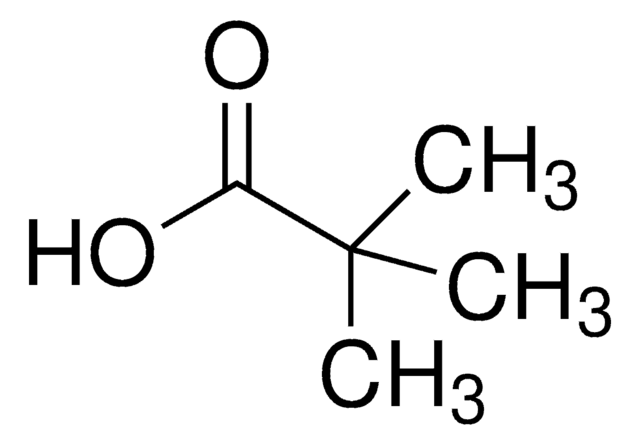222453
3-Methylvaleric acid
97% (GC)
Synonym(s):
3-Methylpentanoic acid, (±)-3-Methylvaleric acid
Sign Into View Organizational & Contract Pricing
All Photos(1)
About This Item
Linear Formula:
CH3CH2CH(CH3)CH2CO2H
CAS Number:
Molecular Weight:
116.16
Beilstein:
1720696
EC Number:
MDL number:
UNSPSC Code:
12352100
PubChem Substance ID:
NACRES:
NA.22
Recommended Products
Quality Level
Assay
97% (GC)
form
liquid
refractive index
n20/D 1.416 (lit.)
bp
196-198 °C (lit.)
density
0.93 g/mL at 25 °C (lit.)
functional group
carboxylic acid
SMILES string
CCC(C)CC(O)=O
InChI
1S/C6H12O2/c1-3-5(2)4-6(7)8/h5H,3-4H2,1-2H3,(H,7,8)
InChI key
IGIDLTISMCAULB-UHFFFAOYSA-N
Looking for similar products? Visit Product Comparison Guide
Related Categories
Application
3-Methylvaleric acid (3-Methylpentanoic acid) was used in the synthesis of 3-methyl-1-pentanol.
Signal Word
Danger
Hazard Statements
Precautionary Statements
Hazard Classifications
Skin Corr. 1B
Storage Class Code
8A - Combustible corrosive hazardous materials
WGK
WGK 3
Flash Point(F)
185.0 °F - closed cup
Flash Point(C)
85 °C - closed cup
Personal Protective Equipment
dust mask type N95 (US), Eyeshields, Gloves
Choose from one of the most recent versions:
Already Own This Product?
Find documentation for the products that you have recently purchased in the Document Library.
Customers Also Viewed
Complete structures of the sphingosine analog mycotoxins fumonisin B1 and AAL toxin TA : Absolute configuration of the side chains.
Shier WT, et al.
Tetrahedron Letters, 36(10), 1571-1574 (1995)
Specificity of the effects of leucine and its metabolites on protein degradation in skeletal muscle.
W E Mitch et al.
The Biochemical journal, 222(3), 579-586 (1984-09-15)
The effects of leucine, its metabolites, and the 2-oxo acids of valine and isoleucine on protein synthesis and degradation in incubated limb muscles of immature and adult rats were tested. Leucine stimulated protein synthesis but did not reduce proteolysis when
Yoshifumi Fujita et al.
Journal of receptor and signal transduction research, 27(4), 323-334 (2007-09-22)
Dresden G protein-coupled receptor (D-GPCR) is one of orphan G protein-coupled receptors (GPCR). Here we report the identification of the ligands and the characterization of D-GPCR. We investigated over 5000 compounds to evoke the response mediated by D-GPCR and identified
Our team of scientists has experience in all areas of research including Life Science, Material Science, Chemical Synthesis, Chromatography, Analytical and many others.
Contact Technical Service











